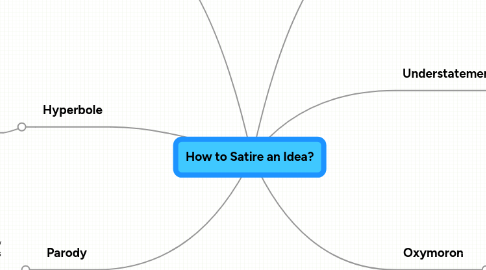
1. Allusion
1.1. Definition: implying something to another object or idea to something expected to be familiar to everybody
1.1.1. Page 11, Paragraph 2
1.1.1.1. "Paquette received this...I am dying of it.'"
1.1.1.1.1. This is assuming that everyone knows who Christopher Columbus, because Voltaire makes a connection to him without explaining who it is. It is clear that he is not a character of the story because he never comes out. Christopher Columbus is being implied to the disease that Pangloss has. It is implied that if Columbus was never alive, then he would never have this disease.
1.1.2. Page 75, Paragraph 2
1.1.2.1. "'They are by Raphael,'"
1.1.2.1.1. This is the part of the story where Candide is looking at a painting. The Senator states how it is done by the artist named Raphael. The object being implied here is the painting, and it is being implied that it is done by Raphael. The author does not ever mention Raphael and Raphael is not a character in the book. Raphael is an outside character, being stated as a representative.
2. Parody
2.1. Definition: an imitation or mock, usually in a comical sense, of a artist or writer's work, by copying the style
2.1.1. Page 9, Paragraph 1
2.1.1.1. "the Pope was Anti-Christ..."
2.1.1.1.1. This is a parody because of the idea of the Pope being Christian is being ridiculed. Please, I mean no discrimination to anyone. The Pope of a church is supposed to be a strong believer of God, but having a Pope that is Anti-Christ would be ridiculing the idea.
2.1.2. Page 15, Paragraph 1
2.1.2.1. "'This is all for the best,' he said. 'For if there is..."'
2.1.2.1.1. This is a parody of Gottfried Wilhem von Leibniz, who was the philosopher that believed in the fact that,God created everything in the world for the good of man, if there is evil in the world, then God created it to help mankind, and all is for the best.
3. Hyperbole
3.1. Definition: a dramatic exaggeration that is not meant to be taken literally
3.1.1. Page 24, Paragraph 2
3.1.1.1. "my heart is almost sealed against hope.'"
3.1.1.1.1. This is a hyperbole because it is exaggerating the amount of disappointment and disparity she has been facing. She had been faced with so many hardships that everything looks hopeless. Cunégonde exaggerates it by saying how her heart has completely given up on even trying to look for hope.
3.1.2. Page 24, Paragraph 2
3.1.2.1. "'I love you with all my heart,'"
3.1.2.1.1. This specific example of hyperbole is one that we use quite often. When you tell someone you love them with all your heart, that shows how you love them very much, but it is a dramatic exaggeration. You cannot really love someone with your heart, and therefore it is a hyperbole, but it is so common, some people do not realize it.
4. Irony
4.1. Defintion:Something that happens at the least expected times
4.2. Examples from Candide
4.2.1. Page 40, Paragraph 2
4.2.1.1. "He was about to continue...may land us in trouble'"
4.2.1.1.1. This is an example of irony, because as a reader, I was not expecting the monkeys and the ladies to be lovers. I expected the monkeys to be actually trying to hurt the ladies. Then all of a sudden, the story tells us that the ladies and monkeys are lovers.
4.2.2. Page 13, Paragraph 1
4.2.2.1. "He tries to jump...ashore on a plank."
4.2.2.1.1. The Anabaptist only wanted to help the crew, but when he fell into the water, no one came into save him. As a reader, they would expect for nice people to be helped when they are in need, but these selfish crew members did nothing to help the Anabaptist.
5. Oxymoron
5.1. Definition: when two contradicting ideas are put together to make a phrase
5.2. Examples from Candide
5.2.1. Page 9, Paragraph 2
5.2.1.1. "A passer-by who had never been baptized, a good Anabaptist named Jacques..."
5.2.1.1.1. An Anabaptist is someone who believes that only adults are smart enough to be baptized. Jacques is now an adult, and he is still not baptized, when he believed that only adults should do it. He never got it as a child and still did not get it as a child. The two contradicting ideas here are the idea of adults being baptized, an adult who was never baptized who believes in the previous idea.
5.2.2. Page 9, Paragraph 1
5.2.2.1. "the Pope was Anti-Christ..."
5.2.2.1.1. This is an oxymoron because the Pope in a church is supposed to be a strong believer of Christ, but in this excerpt, the Pope is Anti-Christ. The two contradicting ideas are, the Pope, who is believed to be a strong believer in God, and an Anti-Christ, who is a person who doesn't believe in God.
6. Understatement
6.1. Definition: when you decrease the severity of something dramatically
6.2. Examples from Candide
6.2.1. Page 24, Paragraph 2
6.2.1.1. "'but you have suffered nothing like my misfortunes,'"
6.2.1.1.1. This is an understatement because the old woman is trying to degenerate the problems that Cunégonde had gone through. Cunégonde complains about her problems but the women talks about how it's not that bad and how the old woman's problems are much more worse.
6.2.2. Page 15, Paragraph 1
6.2.2.1. "but Pangloss consoled them...For all is well.'"
6.2.2.1.1. This is an understatement because Pangloss is telling everyone it's not as bad as it seems. While everyone was grieving over the earthquake, Pangloss says how it is not as bad as it seems because it is all for the best. He tries to make it less severe than it actually is.
